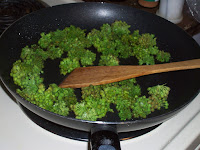Milkweed
 |
| Milkweed flower |
It is important for the survival of the monarch butterfly that there is a 'milkweed highway' from Canada all the way down to Mexico. This is because milkweed in the only plant on which monarch caterpillars feed. Growing milkweed does not have to be just for this reason. The flower is attractive and the smell is strong, which makes it an appealing nectar source for other insects as well. Honey bees can harvest the nectar for their honey, solitary bees, and other butterflies come feed too.
 |
| Monarch caterpillar |
The most fascinating part of my milkweed education was learning that it is food for humans too! I love all things edible, and as an environmentalist farmer I like finding perennial food sources that don't require any digging!
Here is what I learned from a book called Backyard Foraging by Ellen Zachos:
Young milkweed shoots are tender and can be harvested when they are 6 to 8 inches tall, just snap them at the base. Then, remove the mature leaves but leave a few immature leaves at the top of the stem. To eat milkweed, you need to boil or blanch the plant before cooking with it. This removes the bitter sticky white goo inside. Once it has been immersed in boiling water for 1 or 2 minutes, treat it like green beans. They taste similar to green beans, but better (according to Ellen!).
The unopened flower buds are described as being tastier than broccoli. Harvest when they are still tightly bunched together, green, and golf ball size. Again, you must blanch first. Then try steaming them with salt and serve with olive oil.
 The immature seedpods (1 1/2 inches long, inside should be all white- the seeds should not be turning brown yet!) can be harvested and blanched. Then, try them in soups, stews, or stir-fries.
The immature seedpods (1 1/2 inches long, inside should be all white- the seeds should not be turning brown yet!) can be harvested and blanched. Then, try them in soups, stews, or stir-fries.
Eden is a place where we can live from the land without destroying it. What better way than to allow this 'weed' a place in your garden. The monarch gets a place to lay eggs, the bees get a drink of nectar, and you get to try eating one of thousands of plant species we have forgotten.
Fantastic!


 The immature seedpods (1 1/2 inches long, inside should be all white- the seeds should not be turning brown yet!) can be harvested and blanched. Then, try them in soups, stews, or stir-fries.
The immature seedpods (1 1/2 inches long, inside should be all white- the seeds should not be turning brown yet!) can be harvested and blanched. Then, try them in soups, stews, or stir-fries. 

I'm definitely going to plant milkweed in my yard next year! How else can we encourage the monarchs? I've only seen one this year! - Leslie
ReplyDelete